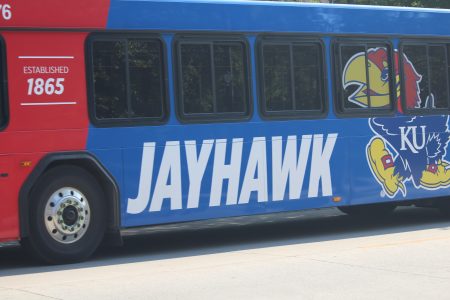KU says better-than-expected enrollment, savings measures amid pandemic shaved $72M off projected budget shortfall

photo by: Conner Mitchell/Journal-World
A bus, equipped with new university decals, drives on the University of Kansas campus.
After announcing in May that it was projecting a $120 million budget shortfall for fiscal year 2021 because of losses from COVID-19, the University of Kansas on Friday announced that the deficit for this budget year is only $47.6 million — 60.3% less than the shortfall that was originally expected.
In a campus message Friday, KU Chancellor Douglas Girod and Provost Barbara Bichelmeyer announced that enrollment figures for the fall semester fell by much less than the university projected when it estimated the original $120 million shortfall. That shortfall, the message said, was based on enrollment figures falling by 15%, but KU and the Kansas Board of Regents announced earlier this month that enrollment fell by only 2.8%.
The $47.6 million shortfall is broken down into three components, Girod and Bichelmeyer said:
• General fund academic operations (funded primarily by tuition and state funding) – $11.4 million
• Auxiliaries (such as KU Housing, Recreation Services, Parking, Watkins Health Center) – $19.7 million
• Affiliates (such as Kansas Athletics, Memorial Union, Hilltop Child Development Center, Office of Research) – $16.5 million
Much of KU’s financial situation remains up in the air, the message said, and is dependent on what level of funding the Kansas Legislature is able to grant the university in the next legislative session — while the state faces a $1.4 billion shortfall due to the pandemic — and whether the federal government passes another stimulus package at some point in the future.
The shortfall was also reduced significantly by one-time savings measures KU implemented at the beginning of the pandemic, including administrative salary cuts, faculty and staff salary cuts for those making over $50,000, and a voluntary separation incentive program for certain employees. Without those cost-cutting measures, Girod and Bichelmeyer said the current shortfall would still be $80.7 million.
“In other words, these are the projected shortfall amounts that need to be addressed for the next fiscal year budget, which begins July 1, 2021,” the two leaders wrote. “Therefore, we must continue to make difficult and painful cost-savings decisions in the months ahead.”
KU has said it incurred $30 million in additional expenses related to COVID-19 safety as it reopened the campus for the fall semester, which presented even more budgeting challenges initially. However, Girod and Bichelmeyer said that $20 million of those expenses were covered by federal funding, and the other $10 million has been covered through a grant from KU Endowment, the university’s independent fundraising entity.
While enrollment figures for the fall semester were relatively good news, Girod and Bichelmeyer said they remained concerned about the spring semester enrollment given the financial challenges many students and families are still facing because of COVID-19. What’s more, the one-time savings measures KU has implemented will only carry through fiscal year 2021, which ends in June.
“The bottom line is, the Lawrence and Edwards campuses face unprecedented fiscal challenges that necessitate cost-savings measures in the months and years ahead,” Friday’s message said. “KU has no choice but to adopt new business models, to find efficiencies in our operations, to restructure and to implement cost reductions. All options must be considered, including changes in sourcing and procurement, operations and organizational structures, as well as personnel changes such as furloughs, layoffs and salary reductions.”
“These decisions will be hard, but they are necessary to ensure the long-term health of the university,” Girod and Bichelmeyer said.







